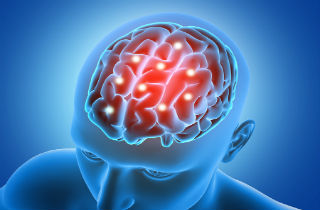We think so.
Current research on marijuana targets the long term effect of cannabis on the brain. Although there is no definite conclusion about the potential for brain damage, there does seem to be a link between heavy marijuana use and damage in brain function. We review here.
What parts of the brain does marijuana affect?
- basal ganglia
- cerebellum
- cortex
- hippocampus
- nucleus accumbens
Short term effects of marijuana on the brain
Most people know that marijuana can affect memory. Marijuana and memory are at the center of current research on THC (the main active chemical in marijuana) effects on the brain. In fact, marijuana is already linked to decreased function of short term memory and has been found to impair a person’s ability to form new memories. But marijuana also affects other function in the brain. How? THC binds to nerve cell receptors in the cerebellum and basal ganglia and can affect the brain. These chemical changes in the brain can result in:
- decreased motivation
- disrupted coordination and balance
- hallucinations (in high doses)
- impaired complicated tasks such as athletics and driving
- impaired mental flexibility
- impaired problem solving
- impaired focus (inability to hold attention)
- increased anxiety
- paranoia
- slower reaction time
Most of the effects of THC last only as long as you are high. How long does weed stay in your system? Although the effects of weed wear off after 3-4 hours, THC can be detected in your system for days or weeks after last use. But what happens if you use marijuana over time?
Long term effects of marijuana on the brain
Current research on marijuana attempts to track the long term effects marijuana has on brain cells, brain structure and brain function. Many researchers are most interested in the effects marijuana has on the brains of young people in adolescence, whose developing brains are vulnerable to drugs. Some fear that heavy marijuana use before age 21 can result in irreversible long term brain damage. Although this is only a theory, neuro-biological relationships between marijuana use and the brain have already shown that weed can affect:
Memory deficits – Persistent deficits in short term memory and information retention have been noted in chronic, heavy marijuana smokers (daily users) after 6 to 12 weeks of abstinence.
Mood disorders – Long term exposure to marijuana in the brain can permanently alter serotonin and norepinephrine, two neurotransmitters associated with both anxiety and mood disorders. As a result, chronic marijuana use may make you more susceptible to developing mood disorders such as depression or panic attacks.
Impaired function – Chronic adolescents who started smoking weed before age 16 showed significantly impaired abilities to perform simple tasks compared to occasional marijuana users or adolescents who abstain. Mental flexibility and focus were the most notable functional differences.
Schizophrenia – Population studies reveal an association between cannabis use and increased risk of schizophrenia. How? Experts think that marijuana can trigger the onset or relapse of schizophrenia in people predisposed to it, perhaps also intensifying their symptoms.
Is brain damage from marijuana use reversible?
Some aspects of brain chemistry return to normal after you stop using marijuana. For example, cannabinoid receptors (involved in pleasure, appetite, and pain tolerance) decrease in number during chronic marijuana use but return to normal when you stop using weed. Some experts even think that cannabis has only benign effects on brain structure. However, research into the long term effects of marijuana on the brain is just beginning. And why risk a lifetime of permanent brain changes when you can alter your path now?
Do you have problems with marijuana?
If you think that you’re smoking too much weed, you probably are. But help is out there. Do you have questions about marijuana use? Do you want to stop smoking marijuana? Please leave your questions or comments here. We will answer you personally!









Related Posts